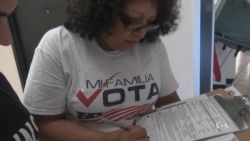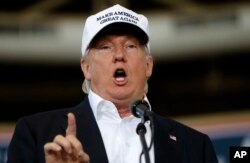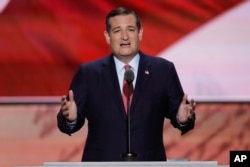Republican Presidential candidate Donald Trump may be in trouble in the most important Republican stronghold state - Texas. Republican candidate John McCain won the Lone Star State by 12 percentage points in 2008 and Mitt Romney won it by 16 points in 2012, but a recent poll shows only a 6 percent gap between Trump and his Democratic rival Hillary Clinton.
Texas all important for Republicans
Texas is important because of its 38 electoral votes, second only to Democratic stronghold California, which has 55. If Trump has to invest time and resources in heavily Republican Texas, it will diminish his efforts in states like Pennsylvania, Ohio and Florida, where the electorate is more evenly divided between Democrats and Republicans.
University of Houston-Downtown political science professor David Branham said Republicans should be concerned by polls showing Trump with anything but a wide lead in Texas.
“If Texas is in play, it is really bad news for Donald Trump,” he said.
But Branham noted that polls could fluctuate a lot in the weeks ahead, and he said a lot will depend on what Trump does and says from now until Election Day.
Hispanic voters key to future
Democrats in Texas have long seen Hispanics as a key factor in winning back the state that was a Democratic stronghold for more than 100 years until the 1970s. Hispanics, which in Texas mostly means Mexican Americans, are the largest minority in the state, numbering 10 million out of a total population of 27.4 million. But their voting turnout rate is far below that of white people and African Americans, diminishing their political power. The same is true of younger voters, whose turnout swings widely from year to year.
Branham, who has done studies on voter demographics and dynamics, thinks it will take a few more decades for Texas to go back to being Democratic, even though the population of older white people, who lean heavily Republican, will decrease while the number of Hispanics and people from Asia, Africa and other parts of the world steadily increases. Around half of the Hispanics in Texas are under the age of 30, while 35 percent of white people are under 30.
Registering young Hispanic voters
Various non-profit, non-partisan civic groups are engaged in getting both Hispanics and younger citizens of voting age to register and vote. One of them is Mi Familia Vota, Spanish for "My Family Votes.” As classes began last week at the University of Houston Downtown, Maria Villenas worked the main entrance hallway, registering anyone she could find. One reason she targeted this school is its more than 40 percent Hispanic enrollment.
Speaking to VOA, she said college students have a big influence in their families.
“I am seeing more of the children asking the parents to register; the children taking the registration forms to the parents; the children driving the parents to vote,” she said,
Branham also sees university students as important agents of political engagement.
“It is not unusual for young people to actually have influence in politics over their parents,” he said. “They come home from the university and talk politics. Now, their parents may not agree with everything, but they talk about it and once that discussion starts going, you start acting on it.”
Trump insults could help Democrats with Hispanics
Texas Democrats see an opportunity this year provided by Donald Trump’s rhetoric - deriding Mexican immigrants as rapists and criminals, proposing a wall across the entire U.S. border with Mexico, and calling for a ban on immigrants from Muslim countries.
As she registered to vote, senior Amy Garcia expressed her disdain for Trump’s anti-Mexican comments, which she said offended her and her Mexican American family.
“I do not agree with what Donald Trump has been doing and saying,” she said, “so I do not want him to be president.”
Laura Montenegro, who works at the university, said Hispanics are not impressed by Trump’s recent attempts to soften his proposals on immigration.
She said, “He has already shown how bad he is, talking bad about Mexicans and women and other people.”
The Cruz factor
Another problem for Trump is that a majority of Texas Republicans voted in the March 1 primary for home state senator and diehard conservative Ted Cruz, who has refused to support Trump.
“A whole lot of people like Trump here in Texas,” Branham said, “But a whole lot more of them voted for Ted Cruz, and Trump and Cruz do not get along.”
But, he said, anti-Trump Texas Republicans are ardently opposed to Hillary Clinton and that could lead to record under voting in the presidential race.
“I would be shocked if either one of these candidates gets 50 percent of the vote,” Branham said. “I think there is going to be at least 10 percent who vote for no one at all on the presidential ticket.”
Texas in play or not?
Another wrinkle is that the percentage of Hispanics who vote Republican in Texas is higher than it is in other states, and Trump’s tough proposals on immigration may not trouble Hispanic voters as much as a slow growth economy and unemployment. Branham notes that many Hispanics, being mostly Catholic, are also put off by the Democrats' support for abortion.
In every election since 1994 in Texas, Republicans have won around a third of Hispanic voters, which, when combined with high turnout from mostly white conservatives, has been enough to win every statewide race. What could make this year different is Donald Trump.








